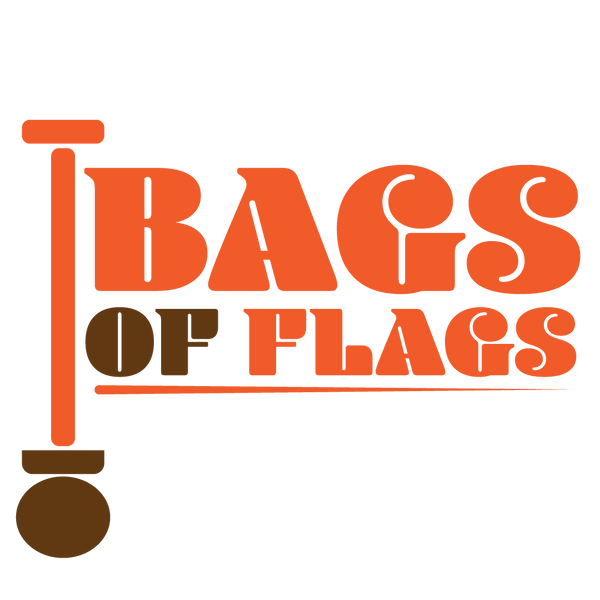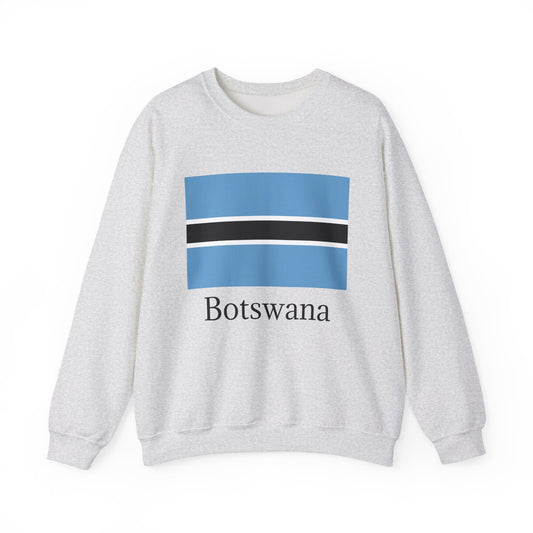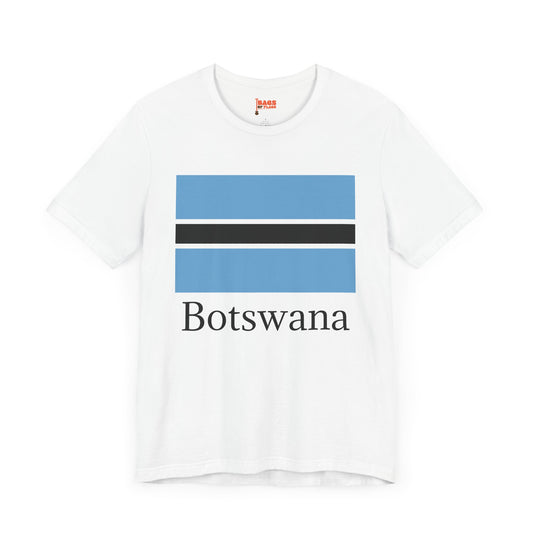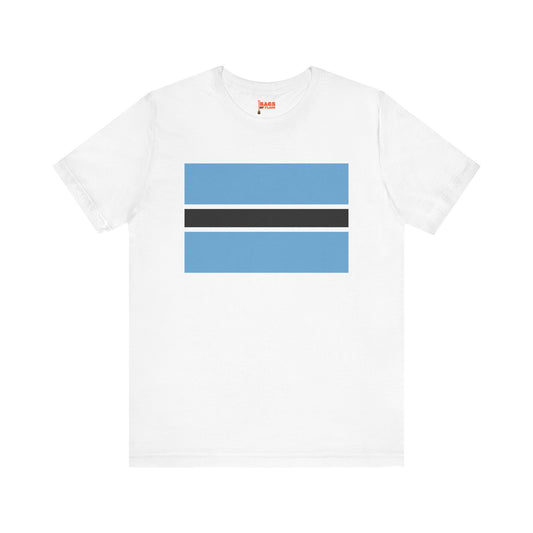-
Botswana Pillow
Regular price $22.65 USDRegular priceUnit price / per -
Botswana Backpack
Regular price $59.79 USDRegular priceUnit price / per -
Botswana Leather Patch Hat
Regular price $18.85 USDRegular priceUnit price / per -
Botswana Sweatshirt
Regular price $34.15 USDRegular priceUnit price / per -
Botswana Flag Sweatshirt
Regular price $34.15 USDRegular priceUnit price / per -
Botswana Mug
Regular price $11.65 USDRegular priceUnit price / per -
Botswana Trucker Cap
Regular price $14.90 USDRegular priceUnit price / per -
Botswana Hoodies
Regular price $34.40 USDRegular priceUnit price / per -
Botswana T-shirt
Regular price $22.79 USDRegular priceUnit price / per -
Botswana Flag Hoodies
Regular price $34.40 USDRegular priceUnit price / per -
Botswana Flag on T-shirt
Regular price $22.79 USDRegular priceUnit price / per
Collection: Botswana
With its unique design and vibrant colors, the Botswana flag holds significant meaning and symbolism for the country. From its historical context to its current relevance, the flag of Botswana is a powerful emblem representing the nation's identity and values.
Overview of the Botswana Flag's Design and Colors

Central to Botswana's visual identity, the national flag features a striking design characterized by a light blue backdrop enveloped by a horizontal black stripe edged with white on both sides. This arrangement captivates the eye and infuses the flag with profound symbolism. Including a distinct zebra head at the hoist side adds a unique element to the flag, making it easily recognizable.
This design elegantly combines simplicity with meaningful representation, using the contrast of colors and imagery to convey the country's values and aspirations. The light blue background symbolizes the importance of water, a precious resource in Botswana's semi-arid environment. At the same time, the black-and-white elements reflect the nation’s commitment to racial harmony and the diversity of its people. This choice of colors and symbols showcases the pride Botswana has in its natural heritage and the principles that guide the nation.
Historical Context Surrounding the Botswana Flag

Adopted on the significant date of September 30, 1966, the Botswana flag was introduced to the world at a pivotal moment in the country's history. This was the day when Botswana declared its independence from British colonial rule, stepping into sovereignty and establishing its identity on the global stage. The flag's creation was overseen by Michael Scott, an Englishman with close ties to Botswana's first president, Sir Seretse Khama. This close collaboration highlighted the importance of designing a flag that would resonate with the values and aspirations of the newly independent nation.
The introduction of the flag coincided with a period of hope and transformation for Botswana. As a new symbol of freedom and national unity, the citizens embraced the flag, beginning a journey toward self-determination and prosperity. The choice of design and colors was carefully considered to reflect the country's commitment to peace, unity, and the harmonious coexistence of its diverse population. The adoption of the flag not only signified the country's break from colonial rule but also its forward-looking vision and the collective ambition of its people to build a united and prosperous nation.
Symbolism Embodied in the Flag
At the heart of the Botswana flag lies a rich tapestry of symbolism, each element carefully chosen to represent the nation's ideals and natural heritage. The dominant light blue background signifies the critical role of water in this semi-arid country, and the sky embodies the nation's hope and aspirations for the future. This expansive blue mirrors the vast Botswana sky, underlining the importance of preserving natural resources and the environment.
The central black stripe, flanked by thin white lines, symbolizes racial harmony and unity among the people of Botswana. This imagery reflects the nation's commitment to social justice and equality, encapsulating the idea that diversity is a strength to be celebrated, not a divide. Including black and white together promotes a message of balance and cooperation between different racial and ethnic groups within the country.
Furthermore, the zebra, a national animal, emphasizes the connection between the people of Botswana and the country's rich wildlife. It symbolizes the importance of wildlife conservation and its role in the nation's identity. The zebra also embodies the idea of uniqueness and diversity, as no two zebras have identical stripe patterns, paralleling the uniqueness of each citizen's contribution to the nation. Through these carefully selected symbols and colors, the flag of Botswana encapsulates the essence of the country's values, aspirations, and commitment to harmony with nature and among its people.
The Current Relevance of the Botswana Flag
Today, the Botswana flag plays a significant role in the nation's life, serving as a unifying symbol during times of celebration and reflection. It is prominently featured at various state functions, including Independence Day commemorations, where it symbolizes the country’s enduring sovereignty and the achievements of its people since gaining independence. In military contexts, the flag represents the honor and duty of the service members who protect Botswana, reinforcing a sense of national pride and collective identity.
In international sports and competitions, athletes carry the flag to represent Botswana on a global stage, showcasing their national heritage and the unity of their people. While there have been discussions about the flag’s design and the meanings behind its symbols, such conversations underscore its role as a living emblem of the nation’s values, aspirations, and ongoing dialogue about its identity. It stands as a reminder of Botswana’s commitment to harmony, diversity, and the respectful coexistence of its citizens, echoing the principles upon which the country was founded.
Additional Facts and Protocols Associated with the Botswana Flag
The Botswana flag must be treated with the utmost respect and dignity, embodying the values and principles of the nation. It is governed by established protocols that dictate its display and handling to ensure it is always presented in a manner befitting its status. Among these protocols, the flag should be prominently placed and must not be allowed to touch the ground, signifying the respect and honor that the nation holds. The Botswana flag takes precedence when displayed alongside other flags and is positioned to fly at the highest point, symbolizing the country's sovereignty.
During official ceremonies and national holidays, the flag is hoisted with great care, often accompanied by the national anthem, to evoke a sense of pride and unity among Batswana. The flag's unchanged design since 1966 signifies the nation's historical continuity and its enduring commitment to the ideals of unity, peace, and harmony that it represents. These protocols and traditions surrounding the flag play a crucial role in fostering national identity and instilling a sense of belonging and pride among the citizens of Botswana.






















